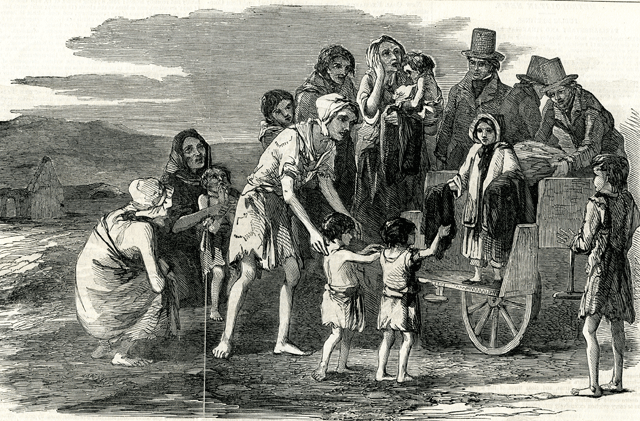 At Millstreet we stopped a few minutes, and most of the passengers took a lunch. A loaf of bread, the shell of half a cheese and a huge piece of cold baked beef were set upon the table in the dirty barroom. Each went and cut for himself, filling mouth, hands and pockets as he chose. Those who took meat paid a shilling ; for the bread and cheese, a sixpence. The Englishmen had their beer, the Irishmen their whiskey, the Americans cold water. Our party came out with hands full, but the host of wretches about the coach, who seemed to need it more than we, soon begged it all away from us, and then besought us, ” Please, sir, a ha’-penny, and may God reward ye in heaven.” A woman lifted up her sick child, in which was barely the breath of life, muttering, ” Pray, yer honour, give me a mite for my poor childer, a single penny, and may God save yer shoul.” Several deformed creatures stationed themselves along the street, and shouted after us in the most pitiful tones. Others ran beside the [read more …] “A Visitor to Millstreet in 1850”
At Millstreet we stopped a few minutes, and most of the passengers took a lunch. A loaf of bread, the shell of half a cheese and a huge piece of cold baked beef were set upon the table in the dirty barroom. Each went and cut for himself, filling mouth, hands and pockets as he chose. Those who took meat paid a shilling ; for the bread and cheese, a sixpence. The Englishmen had their beer, the Irishmen their whiskey, the Americans cold water. Our party came out with hands full, but the host of wretches about the coach, who seemed to need it more than we, soon begged it all away from us, and then besought us, ” Please, sir, a ha’-penny, and may God reward ye in heaven.” A woman lifted up her sick child, in which was barely the breath of life, muttering, ” Pray, yer honour, give me a mite for my poor childer, a single penny, and may God save yer shoul.” Several deformed creatures stationed themselves along the street, and shouted after us in the most pitiful tones. Others ran beside the [read more …] “A Visitor to Millstreet in 1850”
Tag: 1850
Most Extraordinary Evidence (1850)
That fact is stronger than fiction, is fully verified in the following true case of Irish ingenuity, in which the ferocious and the absurd are curiously blended. At the present sessions now holding in Mallow an unhappy wretch was indicted for stealing turnips from the field of Mr. Leader of Millstreet, in this county, the principal witness being the watchman, known familiarly as “Mad Tom Eagar.” The attorney who defended the prisoner as “the length of himself,” but upon being further pressed he coolly said – “Didn’t I know what the attorney would be at, and what he’d try to make me swear! Faith I did so, and when I caught the prisoner I knocked him down and took out my knife and cut off a piece of his ear, that I might match it, next day.” This terrific statement was mournfully corroborated by the prisoner in the dock, who turned his mutilated ear to the bench, crying out at the same time in a piteous tone – “Oh! wisha, me lord, sure enuf he did crap me!” The worthy assistant-barrister, who was justly horrified at the act, vented his indignation in the strongest terms, and expressed a wish that he had the witness in the dock, but the witness seemed to look upon this startling mode of procuring conclusive testimony as entitling him to a civic crown instead of meriting a judicial reprimand.– Cork Examiner April 1850.
